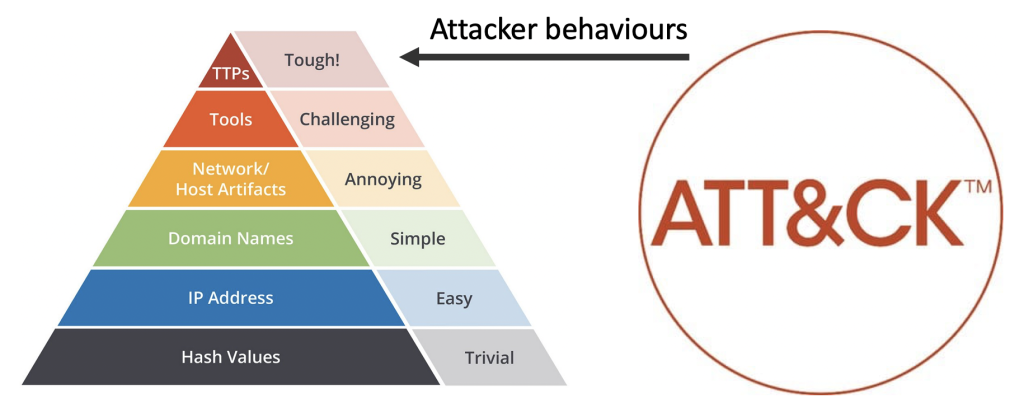Massachusetts, renowned for its technological prowess, has established itself as a global leader in cybersecurity, and this is my post on ATT&CK penetration testing. At the forefront of this reputation is the MITRE ATT&CK framework, a dynamic tool deeply rooted in the state’s commitment to advancing cybersecurity practices. This article explores the extensive use of the ATT&CK framework in penetration testing (pentest), highlighting the intrinsic connection to Massachusetts and the collaborative efforts propelling its evolution.
Att&ck penetration testing – Pyramid of Attacker Behaviours :

- Massachusetts: A Hub of Cybersecurity Leadership Massachusetts’ standing as a hub for technological innovation is underscored by its multifaceted contributions to cybersecurity. The state’s dynamic ecosystem, featuring cutting-edge research institutions, collaborative industry initiatives, and government support, has cultivated an environment conducive to innovation. Initiatives such as the Massachusetts Technology Collaborative (MassTech) exemplify the state’s commitment to fostering collaboration and innovation in the realm of cybersecurity. Amidst the plethora of cybersecurity initiatives in Massachusetts, the ATT&CK framework shines as a beacon, epitomizing the state’s dedication to cybersecurity excellence. Collaborative entities like the National Cybersecurity Center of Excellence (NCCoE), based in Massachusetts, actively engage with MITRE to address cybersecurity challenges. This collaboration reflects the interconnected nature of Massachusetts’ cybersecurity initiatives, fostering a holistic approach to tackling evolving cyber threats.
- Att&ck penetration testing:
- The ATT&CK framework has evolved into a cornerstone for penetration testing, endowing pentesters with an extensive knowledge base of threat activities, techniques, and models. Its systematic categorization empowers pentesters to conduct simulated cyber attacks that authentically mirror real-world adversary behaviors. Massachusetts’ influence on the framework is profound, with its commitment to replicating adversary tactics contributing significantly to the effectiveness of penetration testing activities. The ATT&CK framework, originating from Massachusetts, systematically categorizes adversary tactics and techniques. This categorization allows pentesters to simulate a broad spectrum of cyber threats during their assessments. By aligning pentests with real-world scenarios, organizations receive a holistic evaluation of their vulnerabilities and defenses. In addition to MITRE’s contributions, the Massachusetts Cybersecurity Forum serves as a public-private partnership facilitating collaboration and information sharing among cybersecurity professionals. This forum actively contributes to the state’s vibrant cybersecurity ecosystem, fostering continuous improvement and knowledge sharing.
- Massachusetts‘ Ongoing Impact in Cybersecurity : Massachusetts continues to play a pivotal role in the evolution of the ATT&CK framework. The release of Version 8.0 in 2020 underscores the state’s unwavering commitment to staying at the forefront of cybersecurity innovation. This dedication ensures that pentesters have access to the latest threat intelligence, showcasing Massachusetts’ proactive stance in addressing emerging cyber threats. Ongoing contributions from Massachusetts-based entities, coupled with collaborative efforts from the broader cybersecurity community, underscore the dynamic nature of the ATT&CK framework. The state’s commitment to innovation and adaptation positions it as a trailblazer in shaping the future of cybersecurity practices. The Massachusetts Cybersecurity Center, a collaborative initiative involving academia, industry, and government, has played a pivotal role in advancing cybersecurity research and innovation. This center actively contributes to the state’s position as a global cybersecurity hub, promoting interdisciplinary collaboration.
- Collaboration with STIX: Enhancing Pentesting Realism : Collaborating seamlessly with the ATT&CK framework is the Structured Threat Information eXchange (STIX), another cybersecurity initiative originating from Massachusetts. STIX facilitates the exchange of cyber threat information, allowing pentesters to integrate real-world threat data into their assessments. This collaboration enhances the realism of pentests, creating a comprehensive cybersecurity ecosystem. Massachusetts’ influence extends beyond the ATT&CK framework, encompassing initiatives like STIX. The collaboration between these tools not only exemplifies the state’s commitment to cybersecurity but also enhances the effectiveness of penetration testing by providing pentesters with valuable real-world threat data. The interconnected efforts of Massachusetts-based initiatives, such as STIX, showcase the state’s role as a leader in shaping a collaborative and realistic cybersecurity landscape.
- A Comprehensive Table Illustrating ATT&CK Tactics and Techniques with Hyperlinks : In the realm of penetration testing, understanding how the ATT&CK framework categorizes tactics and techniques is fundamental. The comprehensive table below provides detailed insights, including hyperlinks, emphasizing the relevance of each tactic and technique to pentesting scenarios.
This comprehensive table, enriched with hyperlinks, serves as a valuable reference for pentesters, enabling them to align their assessments with real-world scenarios and utilize ATT&CK tactics and techniques as a foundational framework, ensuring a thorough understanding of potential threats.
The MITRE ATT&CK framework, developed by MITRE, deeply rooted in Massachusetts, stands as an invaluable asset for penetration testers globally. The state’s commitment to cybersecurity excellence, demonstrated through ongoing contributions and collaboration, has positioned Massachusetts as a leader in shaping the future of cybersecurity practices. The integration of the (Att&ck penetration testing) framework with initiatives like STIX showcases not only the state’s commitment but also its ability to create a holistic cybersecurity ecosystem.
Massachusetts’ impact transcends geographical boundaries, influencing the broader cybersecurity community. The ATT&CK framework, with its systematic approach to categorizing adversary behaviors and continuous evolution, remains a testament to Massachusetts‘ proactive stance in addressing emerging cyber threats. As the state continues to contribute to cybersecurity innovation, the ATT&CK framework remains a beacon, guiding penetration testers and organizations towards a more secure digital future. This is my post on Att&ck penetration testing.
Leave a Reply